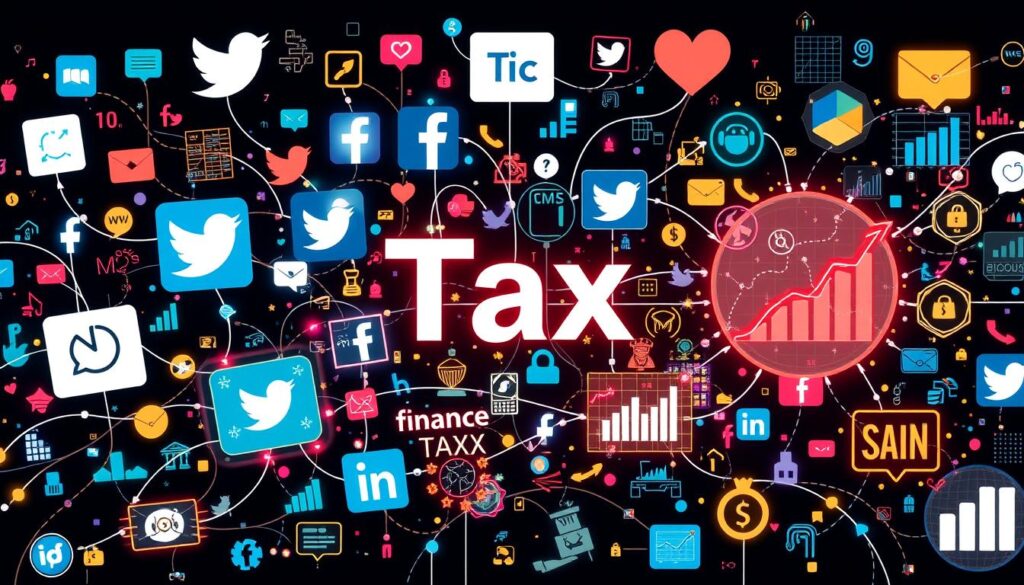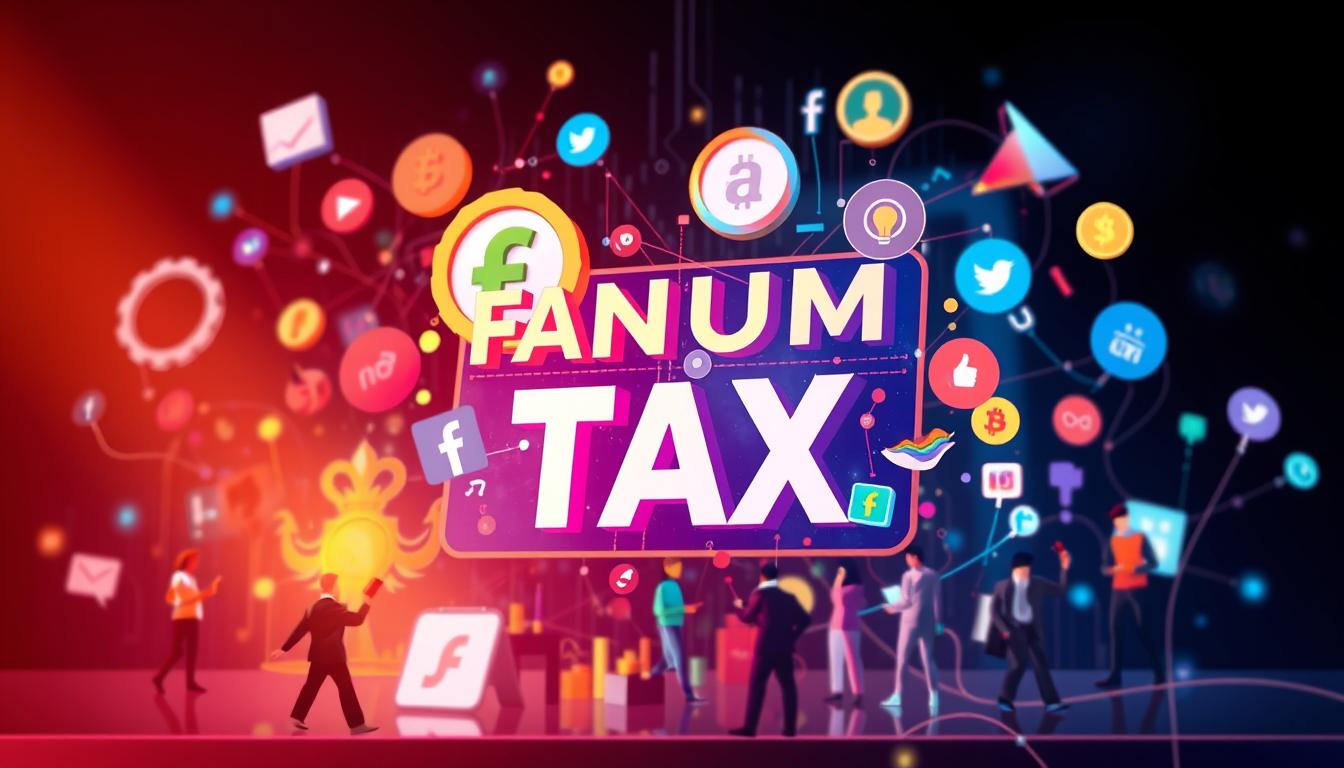Did you know half the folks in a survey didn’t really know slang meanings? Today, terms like fanum tax are getting popular, especially with the young crowd. Social media keeps changing how we talk, making some of us quite puzzled. This is very true for Gen Alpha who use internet slang easily. In fact, over two-thirds of their parents get annoyed by slang1. So, understanding fanum tax helps us connect better and get why these new words matter.
Key Takeaways
- Fanum tax represents a growing trend in internet slang, especially among younger audiences.
- A significant portion of the population is disconnected from current slang, which can impact communication.
- Understanding fanum tax and similar terms can foster better connections across generations.
- Social media plays a crucial role in the proliferation of new slang and cultural terms.
- Awareness of slang’s meaning is critical, with many users unaware of what they are actually saying.
Introduction to Fanum Tax
The term fanum tax has become a fun idea among young people online, especially Gen Alpha. It was first used by streamer Kai Cenat in December 2022 and quickly became popular on sites like TikTok and Twitch. This funny term means taking some of your friend’s food, usually between 5% to 50%23.
When joking, someone might say, “My lunch today got fanum taxed by Alia” or “Don’t even think about fanum taxing mine.” These phrases show the playful part of using this term2. Fanum tax helps friends joke around, showing how new words become part of our daily talk23.
But this term isn’t just for joking about food. It’s also used for compliments, like saying “Jack really worked on looking good, and now he looks fanum taxed”2. This shows how fanum tax can be used in many ways and how new words change how we talk online. It also shows the gap in how different generations understand and enjoy new slang3.
The Origins of the Term “Fanum Tax”
The story behind fanum tax digs deep into today’s internet culture. It shows how creators like Fanum, a big name on Twitch, have made a splash. Roberto Escanio, better known as Fanum, became a star in the streaming world after joining AMP. This group houses stars like Kai Cenat. Starting in the Bronx, Fanum’s rise in 2022 led him to big moments in streaming, like going to the Streamer Awards.
Who is Fanum?
Fanum stands out for his funny videos and charming ways. Born in 1997, he quickly became a hit with fans for his fun streams. Being part of AMP made him even more well-known in gaming and entertainment.
How the Term Came About
The phrase fanum tax came from a funny bit where Fanum would “tax” food by taking bites from friends on his streams. This bit turned into the term fans use to tease about sharing food. It spread fast on TikTok and Instagram, loved by Gen Alpha. Videos of Fanum’s hilarious food moments helped. The term isn’t just about food. It shows the fun between friends with phrases like “fanum taxed” or “bring together fanum tax”452.

What Does Fanum Tax Mean?
The definition of fanum tax is about getting food from friends in a fun way. It’s a term that captures a sense of togetherness, especially among the youth who see it as their own food sharing slang. The idea of fanum tax emphasizes that sharing food is joyful. It views eating together as a happy exchange among buddies.
Fanum tax is all about the joy of sharing. It means that “taxing” really aims to build friendship rather than benefit from it. On sites like TikTok, fanum tax has become a big deal, drawing millions of views. For example, a TikTok by Anthony Mai talking about fanum tax got over 3.7 million views5. This shows how well it fits into today’s culture. Young folks find new ways to express sharing through this trend.
Many enjoy the funny side of “taxing” seen in comedy videos. Creators like @JustFanum and the AMP group made fanum tax famous among their fans6. As times change, so do ways of connecting. Fanum tax proves that even traditional values like sharing can find a place in today’s online slang and social trends.

How Fanum Tax is Used in Everyday Language
Fanum tax has become a common topic in daily talks, especially among the youth. It shows how new words are crafted by various age groups. “Hit her with Fanum tax” or “Time to collect my Fanum tax” are sayings you might hear when friends are sharing food. These phrases show fanum tax’s role in light-hearted chats, adding fun and friendship to the mix.
Common Phrases and Usage Examples
With fanum tax becoming trendy, many fun sayings have popped up. They bring laughter and sharp observations into everyday talks. For example:
- “Time to hit him with that fanum tax!”
- “You can’t dodge the fanum tax!”
- “Looks like I owe some fanum tax today.”
A lot of people use these sayings, even if they don’t quite get them1. It shows how humor and puzzlement often mix when language changes with time.
Context of Use Among Different Generations
Different ages understanding fanum tax varies a lot. Kids today add it smoothly into their vocabulary, while older folks might scratch their heads. A 26-year-old fitness star was puzzled by “Fanum tax”, pointing out that staying trendy can be hard5. It began as a joke among Gen Z, leaving some TikTok fans feeling left out6. Even a 17-year-old admitted they needed help to get it, revealing it’s not just adults who are a bit confused1.

The Impact of Social Media on Fanum Tax Popularity
Social media, especially TikTok and YouTube, has significantly boosted the popularity of fanum tax. Memes and slang spread quickly among users, showing social media’s strong cultural influence. For example, fanum tax became a hot topic with many TikTok clips getting millions of views. This has made the term more popular and shows how phrases can quickly change online.
Stans, or super fans, have a big online influence. They make memes and fan edits, shaping fandom culture. Their efforts have even changed real things like concert ticket prices, thanks to Taylor Swift’s fans, the Swifties7. Also, new slang like “gyatt” from Twitch streamer Kai Cenat has brought new words to our online chats8.
Influential creators help these trends grow. The link between phrases like fanum tax and audience engagement means slang evolves deeply. As people keep using these words, online chat changes to include new expressions. Social media’s reach means a popular term can quickly become well-known by many, not just young people.

| Trend | Platform | Influence |
|---|---|---|
| Fanum Tax | TikTok | Viral engagement and language evolution |
| Gyatt | Twitch | Creation of new cultural vocabulary |
| Skibidi | Various (TikTok, YouTube) | Remix culture and meme generation |
| Standom | Twitter, Instagram | Collective fan influence in real-world decisions |
Social media encourages lively discussions and greatly influences how language is created and spread among users.
Reactions from Different Age Groups to Fanum Tax
The way people talk changes over time, leading to different age group reactions to words like “Fanum tax.” Every generation has its own way of seeing this term. This results in a mix of understanding and confusion.
Gen Z’s Perspective on Fanum Tax
For Gen Z, “Fanum tax” is often confusing. Even though they’re very involved online, many find the meaning of this term hard to catch. The song known as the “Fanum tax” song, “Sticking Out Your Gyat for the Rizzler,” is puzzling to them. This shows a clear gap in slang understanding between generations6.
The rapid change in slang, mostly coming from younger kids, is tough for Gen Z to follow9.
Understanding Gen Alpha’s Take
Gen Alpha, however, sees “Fanum tax” differently. To them, it’s a fun part of how they talk. They’re at ease using new words like “skibidi” and “rizz.” This shows they’re more comfortable with “Fanum tax” compared to older people. Also, they love how this term fits into viral trends on TikTok6.
Gen Z’s Perspective on Fanum Tax
Many in Gen Z find the confusion over “Fanum tax” amusing. They go online to talk about what this term and others might mean. This shows they’re trying to stay up-to-date with how language is changing. They notice a gap in understanding the new slang between them and Gen Alpha. This leads to deep talks about who they are and how they express themselves online.
Understanding Gen Alpha’s Take
Gen Alpha is good at keeping up with new ways of talking. Their excitement for “Fanum tax” shows how into new phrases they are. This may lead to conversations about the future of slang and online talk as they grow older. It makes people wonder how digital culture and language will evolve in the future.

Why Fanum Tax Matters in Internet Culture
The importance of fanum tax in today’s internet scene links to how language changes. It came from the fun chats on social media, showing how young people talk and create new words that show their culture. A TikToker named Anthony Mai talked about “fanum tax” in a video. It got over 3.7 million views, proving it’s a big deal to users10.
New slang words like fanum tax are popping up all the time. Generation Alpha, the internet pros, use them to describe new ideas. They also use words from video games and memes. For example, “sigma” means someone who leads or is popular. “Skibidi” is another new word, growing popular just like fanum tax1112.
Youth today use slang that can be playful but confusing. Nathan Freihofer, a fitness star, felt “old” when he heard about fanum tax. This shows the gap between generations in understanding and humor10. It makes us see how new phrases can confuse older people.
Fanum tax lets us see how online talk is changing. It’s become a hot topic and meme online. This slang keeps evolving with new internet users, making a mark in young people’s culture.

| Term | Meaning | Generation |
|---|---|---|
| Fanum Tax | To steal something or take a bite of someone else’s food | Gen Z & Gen Alpha |
| Sigma | Denotes dominance or leadership | Gen Alpha |
| Ate | Impressive or outstanding | Gen Alpha |
| Bussin’ | Exceptionally delicious food | Gen Alpha |
| Skibidi | Good or bad based on context | Gen Alpha |
Conclusion
Fanum tax teaches us more than just a new word. It shows how slang marks the culture of communication, especially online. This term comes from a Twitch streamer’s world, showing how young people change language. It helps us understand each other better in our day-to-day chats.
Different age groups take to fanum tax in unique ways, showing the impact of the internet on words. For Gen Z, slang is more than just words. It’s a way to connect and show what matters to them. This shows us how flexible and creative language can be with the youth leading the way.
Realizing what fanum tax means goes beyond just following a trend. It helps us see how language, culture, and community are linked. Getting into discussions about it, whether critical or praising, adds depth to conversations about who we are. Let’s welcome how language evolves and the understanding it brings. These talks add to our cultural mix1314.
FAQ
What is fanum tax?
Where did the term fanum tax originate?
Why do younger generations use slang like fanum tax?
How has social media influenced the popularity of fanum tax?
Do older generations understand fanum tax?
What are some common phrases associated with fanum tax?
Is there a generational divide in using slang like fanum tax?
Source Links
- What Parents Should Know About the Popular Slang Term Fanum Tax – https://www.parents.com/fanum-tax-meaning-and-origins-8675772
- Learn the “fanum tax” meaning in Detail Introduction: – https://techbullion.com/learn-the-fanum-tax-meaning-in-detail-introduction/
- What is Fanum Tax? Meaning of The Gen Alpha Slang – https://www.easkme.com/2024/10/fanum-tax-meaning-gen-alpha-slang.html
- Fanum Tax Meaning: This Gen Alpha Slang, Explained – https://www.wikihow.com/Fanum-Tax-Meaning
- The new Gen Alpha slang ‘fanum tax’ has even stumped Gen Zers, who worry they’re too old to keep up – https://www.businessinsider.com/fanum-tax-gen-alpha-gen-z-millennials-confusing-slang-2023-10
- What is ‘Fanum tax’? TikTok song of Gen Alpha slang has Gen Z feeling like the new ‘cringe’ generation – https://www.yahoo.com/lifestyle/fanum-tax-tiktok-song-gen-183742630.html
- Is Your Teen a “Stan?” Here’s What You Need to Know – https://www.parents.com/is-your-teen-a-stan-heres-what-you-need-to-know-8760392
- ‘You’re so Skibidi, so Fanum tax,’ and other fun nonsense, explained – https://www.polygon.com/23921363/youre-so-skibidi-so-fanum-tax-and-other-fun-nonsense-explained
- New school year, new slang: Gen Alpha terms explained, no Fanum tax necessary – https://www.newmarkettoday.ca/local-news/new-school-year-new-slang-gen-alpha-terms-explained-no-fanum-tax-necessary-9361154
- The new Gen Alpha slang ‘fanum tax’ has even stumped Gen Zers, who worry they’re too old to keep up – https://uk.news.yahoo.com/gen-alpha-slang-fanum-tax-193928988.html
- Juliana Chan, PhD on LinkedIn: #julianalinkedin #genalpha #generationalpha #slang #linkedintopvoices | 492 comments – https://www.linkedin.com/posts/julianachanphd_julianalinkedin-genalpha-generationalpha-activity-7257559891165229056-TnNQ
- Parents and Gen Alpha kids are having unintelligible convos because of ‘brainrot’ language – https://www.nbcnews.com/news/gen-alpha-kids-parents-brainrot-language-rcna162227
- fanum tax – https://crumbuns.ca/contentai/fanum-tax
- New school year, new slang: Gen Alpha terms explained, no Fanum tax necessary – https://www.ctvnews.ca/lifestyle/new-school-year-new-slang-gen-alpha-terms-explained-no-fanum-tax-necessary-1.7003288









